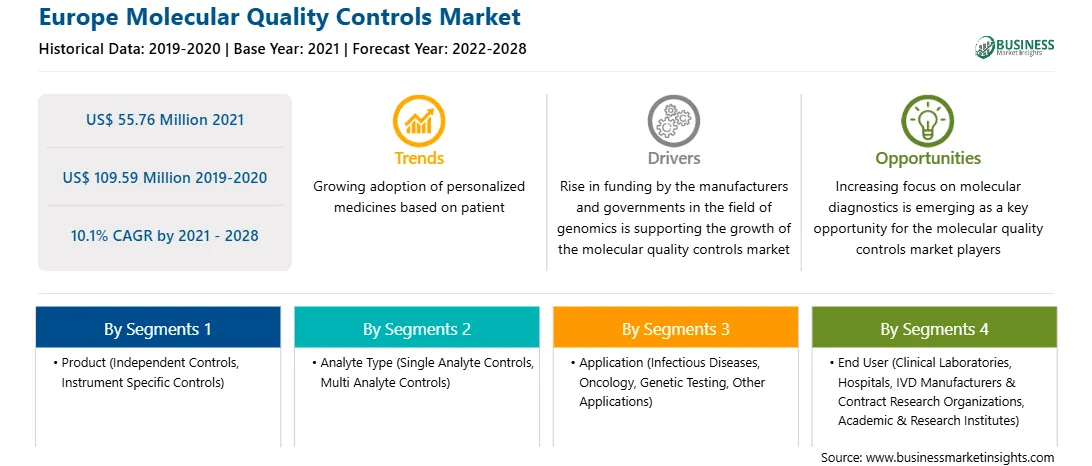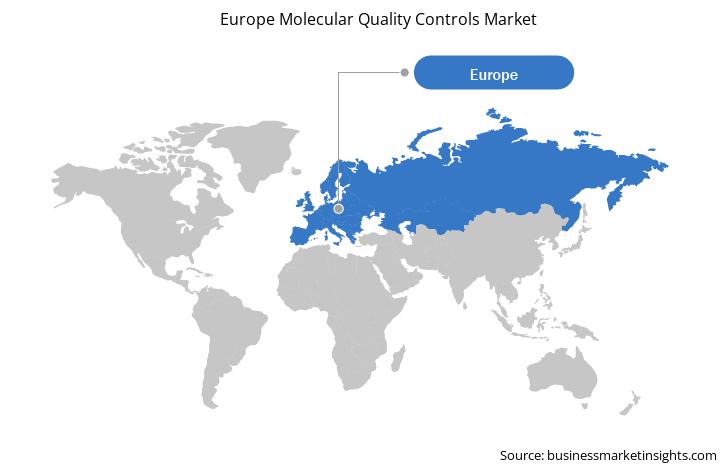Molecular quality controls help to monitor the performance of testing procedures. These tests are helpful to achieve critical and accurate diagnostic information. These controls are used to determine transmissible and genetic diseases too. Moreover, the molecular quality controls also help to monitor the performance of nucleic acid testing protocols for healthcare associated infections, viral load assays and sexually transmitted infections.

Strategic insights for the Europe Molecular Quality Controls provides data-driven analysis of the industry landscape, including current trends, key players, and regional nuances. These insights offer actionable recommendations, enabling readers to differentiate themselves from competitors by identifying untapped segments or developing unique value propositions. Leveraging data analytics, these insights help industry players anticipate the market shifts, whether investors, manufacturers, or other stakeholders. A future-oriented perspective is essential, helping stakeholders anticipate market shifts and position themselves for long-term success in this dynamic region. Ultimately, effective strategic insights empower readers to make informed decisions that drive profitability and achieve their business objectives within the market.

| Report Attribute | Details |
|---|---|
| Market size in 2021 | US$ 55.76 Million |
| Market Size by 2028 | US$ 109.59 Million |
| Global CAGR (2021 - 2028) | 10.1% |
| Historical Data | 2019-2020 |
| Forecast period | 2022-2028 |
| Segments Covered |
By Product
|
| Regions and Countries Covered | Europe
|
| Market leaders and key company profiles |
The geographic scope of the Europe Molecular Quality Controls refers to the specific areas in which a business operates and competes. Understanding local distinctions, such as diverse consumer preferences (e.g., demand for specific plug types or battery backup durations), varying economic conditions, and regulatory environments, is crucial for tailoring strategies to specific markets. Businesses can expand their reach by identifying underserved areas or adapting their offerings to meet local demands. A clear market focus allows for more effective resource allocation, targeted marketing campaigns, and better positioning against local competitors, ultimately driving growth in those targeted areas.

The Europe molecular quality controls market is expected to reach US$ 109.59 million by 2028 from US$ 55.76 million in 2021; it is estimated to grow at a CAGR of 10.1% from 2021 to 2028. Factors such as growing funds for genomics, declining cost of sequencing procedures, and increasing prevalence of genetic diseases fuel the growth of the market. However, the dearth of skilled professionals hinders the market growth.
Genome sequencing has now become one of the common techniques in clinical practices. As per the study ‘Integrating Genomics into Healthcare’, over the next a few years, the healthcare sector is expected to generate genomic data of over 60 million patients. The growing implementation of genomic sequencing in healthcare systems is supported by substantial government investments, totaling over US$ 4 billion by at least 14 countries. The UK announced world’s largest genome project as a part of 200 million public–private collaboration between charitable organizations and pharmaceutical companies. Led by Innovate UK, a part of UK Research and Innovation, the project was initiated to support researchers and industries through funds to combine data and real-world evidence obtained from health services in the UK as well as to create new products and services for more efficient and early disease diagnosis. Such continuous funding by the manufacturers and governments in the field of genomics is supporting the growth of the molecular quality controls market. Also, the cost of genome sequencing, as well as next-generation sequencing, has dropped radically in the past 6–7 years. Moreover, the process requires a lesser number of days for completion. Lowering costs and accelerating overall process enable service providers to secure larger profit margins, along with helping them expand their clientele. Thus, the lowered cost of genome sequencing is propelling the number of molecular biology procedures carried out for different purpose, thereby driving the use of molecular quality controls.
The European region is highly affected by the outbreak of the COVID-19 pandemic. The European economy is severely affected due to the exponential growth of COVID-19 cases in the region. Molecular quality controls is a used in the process for R&D. The rising numbers of product launches in 2020 and rising incidence of COVID-19 has positive impacted in the Europe molecular quality controls market. For instance, UK based Launch Diagnostics introduced AmpliRun and AmpliRun total coronavirus molecular controls for in vitro diagnostic techniques based on nucleic acid amplification. AmpliRun Total is used for external quality control for nucleic acids detection in Europe.
The Europe molecular quality controls market, by product, is segmented into independent controls and instrument specific controls. The independent controls segment held a larger share of the market in 2020 whereas the same is anticipated to register the highest CAGR in the market during the forecast period.
Based on analyte type, the Europe molecular quality controls market has been segmented into single analyte controls and multi-analyte controls. The single analyte controls segment held a larger share of the market in 2020, whereas the multi-analyte control segment is estimated to register the highest CAGR in the market during the forecast period.
The Europe molecular quality control market, by application, is segmented into, infectious diseases, oncology, genetic testing, and other applications. The infectious diseases segment held the largest share of the market in 2020, whereas the oncology segment is anticipated to register the highest CAGR in the market during the forecast period.
Based on end user, the Europe molecular quality control market is segmented into clinical laboratories, hospitals, IVD manufacturers & contract research organizations, academic & research institutes, and other end users. The clinical laboratories segment held the largest share of the market in 2020 and is estimated to register the highest CAGR in the market during the forecast period.
A few of the primary and secondary sources associated with this report on the Europe molecular quality control market are the European Union (EU), European Bioinformatics Institute (EBI), Deutsche Forschungsgemeinschaft (DFG) and Health Education England (HEE).
The Europe Molecular Quality Controls Market is valued at US$ 55.76 Million in 2021, it is projected to reach US$ 109.59 Million by 2028.
As per our report Europe Molecular Quality Controls Market, the market size is valued at US$ 55.76 Million in 2021, projecting it to reach US$ 109.59 Million by 2028. This translates to a CAGR of approximately 10.1% during the forecast period.
The Europe Molecular Quality Controls Market report typically cover these key segments-
The historic period, base year, and forecast period can vary slightly depending on the specific market research report. However, for the Europe Molecular Quality Controls Market report:
The Europe Molecular Quality Controls Market is populated by several key players, each contributing to its growth and innovation. Some of the major players include:
The Europe Molecular Quality Controls Market report is valuable for diverse stakeholders, including:
Essentially, anyone involved in or considering involvement in the Europe Molecular Quality Controls Market value chain can benefit from the information contained in a comprehensive market report.